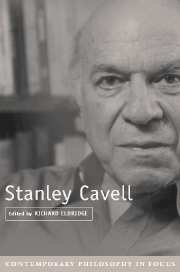Book contents
- Frontmatter
- Contents
- List of Contributors
- Stanley Cavell
- 1 Introduction: Between Acknowledgment and Avoidance
- 2 Stanley Cavell and Ethics
- 3 The Names of Action
- 4 Stanley Cavell's Vision of the Normativity of Language: Grammar, Criteria, and Rules
- 5 Aesthetics, Modernism, Literature: Cavell's Transformations of Philosophy
- 6 A Second Primavera: Cavell, German Philosophy, and Romanticism
- 7 Cavell on American Philosophy and the Idea of America
- 8 “Disowning Knowledge”: Cavell on Shakespeare
- 9 Cavell on Film, Television, and Opera
- Brief Annotated Bibliography of Works by and about Stanley Cavell
- Index
7 - Cavell on American Philosophy and the Idea of America
Published online by Cambridge University Press: 08 January 2010
- Frontmatter
- Contents
- List of Contributors
- Stanley Cavell
- 1 Introduction: Between Acknowledgment and Avoidance
- 2 Stanley Cavell and Ethics
- 3 The Names of Action
- 4 Stanley Cavell's Vision of the Normativity of Language: Grammar, Criteria, and Rules
- 5 Aesthetics, Modernism, Literature: Cavell's Transformations of Philosophy
- 6 A Second Primavera: Cavell, German Philosophy, and Romanticism
- 7 Cavell on American Philosophy and the Idea of America
- 8 “Disowning Knowledge”: Cavell on Shakespeare
- 9 Cavell on Film, Television, and Opera
- Brief Annotated Bibliography of Works by and about Stanley Cavell
- Index
Summary
Here is a common picture of what American philosophy looks like to and within many American philosophy departments. To a considerable degree, it does not exist at all. Most departments do not feel obliged to teach American philosophy as they do modern philosophy (Descartes to Kant) and ancient Greek philosophy. It is normally not part of the requirements for a major. Of course, writings by Americans are mostly what do get taught, but they are taught as just philosophy, not as American philosophy. When it is taught, it is taught as a peripheral history course, typically focusing on the major pragmatist thinkers from the late nineteenth to the mid twentieth century: Peirce, James, and Dewey, with perhaps a turn toward Rorty to round things off. These figures are thought to emphasize the importance of paying attention to what works: to experimental science in the pursuit of knowledge and to liberal reform in politics. The only way to discern what works – in either epistemology or politics – is through trial and error. Epistemology and social theory in any more visionary sense are evaded. Our going practices of experimental science, particularly natural science, have shown themselves to be good enough: neither in need of nor admitting of any further epistemic support from foundationalist theories of justification. In politics, liberal decency, respect for rights, and reliance on markets are about the best we can do.
- Type
- Chapter
- Information
- Stanley Cavell , pp. 172 - 189Publisher: Cambridge University PressPrint publication year: 2003
- 2
- Cited by

